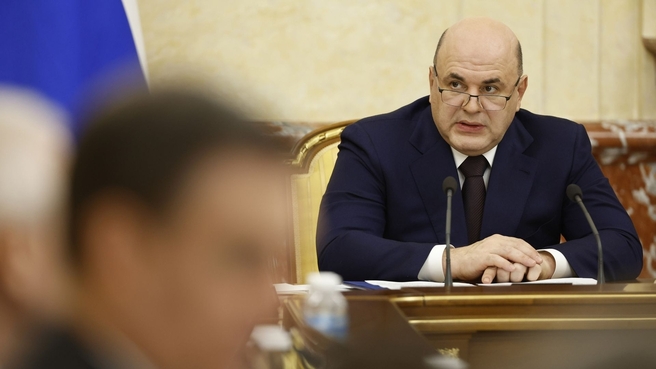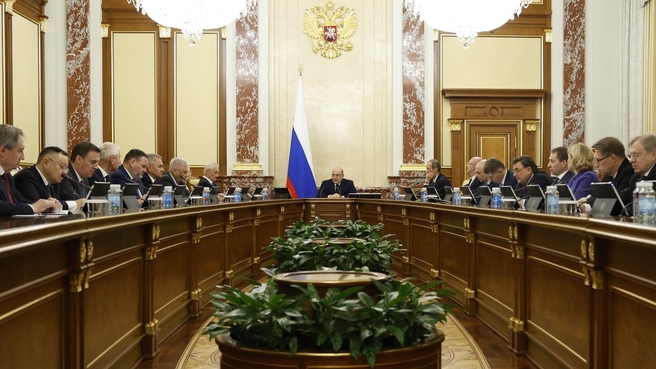The agenda: Presidential instructions following the Direct Line call-in programme, extending the moratorium on audits, expanding and extending the employment subsidies programme, on supporting industrial enterprises, simplifying access to pilot legal systems in the area of digital innovations, subsidising regional road resurfacing projects, increasing the reliability of heat distribution systems.
Mikhail Mishustin’s opening remarks:
Good afternoon, colleagues,
Yesterday, the President summed up the results of the year and replied to questions from citizens and representatives of media outlets. The President issued specific instructions that we must fulfil.
We discussed many issues at the meeting with Vladimir Putin in great detail following Direct Line. I will dwell on some of them, the healthcare sector first. We need to continue upgrading the primary healthcare system, especially in rural areas where the infrastructure still needs to be modernised.
Comfortable conditions for pregnant women have great demographic significance. Future mothers should rest assured that we will do everything possible to protect their health and that of their children. The President said that the state of prenatal clinics, outpatient clinics and hospitals in the regions need to meet contemporary standards.
Providing the three-component measles, mumps and rubella (MMR) vaccine is another important goal. We need to accomplish this objective shortly in order to reduce the number of cases and prevent a shortage of vaccines in the future.
The availability of medical professionals is a serious issue, especially when we are talking about the new Russian regions requiring certain specialists. The President supported an initiative by the Head Physician at the Melitopol Regional Oncology Clinic on expanding low interest (2 percent) mortgage loan plans for new housing in these Russian regions and to the secondary market, like we do in Russia’s Far East.
He also suggested increasing relocation support for those in the Zemstvo Doctor programme in the new regions. Doctors and paramedics would be entitled to 2 million roubles and 1 million roubles, respectively. We will draft the relevant documents.
The President focused on the social sector, stressing the need to maintain the tools that support families with children.
It is important to allocate additional funds for new sports infrastructure in regions and municipalities. School gyms are very popular in the regions. This is not just about a good hobby but also the good health of our children.
We should completely review the current regulations to fully ensure the rights and social guarantees for all citizens who are now defending Russia in the special military operation, whether they are volunteers from the Donetsk and Lugansk people’s republics, contract soldiers or draftees. As the President stressed, all of them should be treated equally. So, I would ask you to take these issues under your control and draft the necessary amendments to the current legislation as soon as possible.
The regions’ initiatives to support disabled and retired people, such as the relocation of these people living in the far north to the Komi Republic, deserve close attention. There has been a request to maintain flat-rate airfares and to develop more routes in the Far East. Under the President’s instructions, this programme will continue.
Also, we certainly need to help the territories bordering Ukraine to ensure conditions for economic recovery in these Russian regions. This issue is on the agenda of today’s Government meeting. I will speak about it in detail a little later.
Another issue is key costs, like for food, essential goods, and housing and utility services. Obviously, each specific case has its own nuances depending on the region. So, I would ask the relevant departments to promptly monitor the situation and respond to groundless overpricing. This must be reported in detail to the Government. Another question raised during Direct Line was infrastructure upgrades. This is important for improving the quality of people’s lives, creating jobs, and increasing the spatial connectivity of Russia’s regions.
The programme on gas distribution infrastructure development will also continue. A project is being drafted to expand the high-speed railway system; the first section connects St Petersburg and Moscow. We also need to continue to develop the domestic aircraft industry in order to provide our fleet with domestic aircraft, including long-range aircraft, in the next six years.
I would ask my deputies to keep these issues under special control. Ministers, heads of services and agencies, please, be advised that it is necessary to take control of all the President’s instructions. The Government is already working on many of them; and it is important to implement them in a timely manner.
Colleagues,
Vladimir Putin has agreed to run for President, to work for the further development of the country, which meets the demands of the people.
The Government of the Russian Federation is Putin's team. We need to continue to act vigorously and effectively for the good of Russia and our citizens.
The President's instructions to the Government are a priority.
By decision of the President, we are extending the moratorium on inspections for the next year.
The ban on such actions will not affect those facilities that are categorised as at high and extremely high risk, as well as in cases where there is a threat to the life and health of people, national security, and when special indicators show a likely violation of mandatory requirements.
The moratorium has already worked well. It has made it possible to seriously, almost by a factor of five, reduce the number of inspections compared to 2019. Businesses have been able to allocate more resources to fulfil their current tasks, as well as to expand projects and develop new markets.
Given the decisions taken by the Government, the prosecution authorities have agreed to include about 93,000 measures in the plan for the current year: this is, by the way, four times less than in 2022.
In many cases, preventive visits have replaced them. They allow entities to identify deficiencies preventively and rectify them without penalties. As of the end of November, their number was almost three times higher than the number of inspections.
One more decision has been taken.
The Government is carrying out systematic work aimed at promoting employment. We are implementing a programme of subsidised hiring. It involves assistance to companies that employ people at risk of dismissal, the unemployed, young people under 30 years old. Such entities receive partial compensation for the salary costs of such employees in the amount of three times the minimum wage.
Next year, companies registered in new regions – Donetsk and Lugansk people's republics, Zaporozhye and Kherson regions – will be able to take advantage of this measure.
Also on the instructions of the President, companies that hire people with disabilities will now receive such state support in the amount of six times the minimum wage as well as individual entrepreneurs or heads of organisations with health limitations, including participants in the special military operation.
Thanks to this decision, more of our citizens will be employed and fewer companies will lack the necessary qualified staff.
Now to the agenda of the meeting.
First of all, we will talk about the issue raised during yesterday's Direct Line with the President about assistance to enterprises located in regions in close proximity to the fighting.
On the instructions of the President, the Government has designed a mechanism that will allow regional industrial development funds to provide grants to such organisations to restore or relocate production and protect it.
About 2 billion roubles will be allocated for this purpose. More than two dozen companies in five Russian regions – Belgorod, Bryansk, Kursk regions, the Republic of Crimea and Sevastopol – will receive the funds.
This decision will help develop domestic business, including in related industries.
The next question concerns the support of the IT industry. Recently, we discussed it in detail at a strategic session on the Data Economy National Project.
The President noted that the technologies for the future should become available today; they should serve all citizens of our country, and work to achieve our national goals. And big data and artificial intelligence play a key role here.
The Government places special emphasis on the introduction of digital innovations. We have established experimental legal frameworks known as regulatory sandboxes – special mechanisms that enable large, small and medium-sized businesses, as well as sole company owners to experiment with innovations by reducing costs and promoting the launch of advanced projects in a variety of areas. These projects span online services for financial and government agencies, aviation, telemedicine, robotics in agriculture, and much more. For example, 10,000 tonnes of freight were transported along the M-11 Neva motorway as part of a project to develop driverless vehicles. Those vehicles travelled over 600,000 kilometres; driverless taxis have made over 12,000 trips. And this is only a small part of the results that we have achieved.
Today, we will adopt a decision to simplify access to such programmes so that even more companies can take advantage of them. To do this, we propose shortening the list of documents to be submitted. And they will be considered at least in half the usual time.
We hope that these measures will lead to faster introduction of new promising products across all industries for the benefit of our people.
Today's agenda includes a range of issues that have to do with assistance to the regions.
According to the goal set by the President, next year, at least 85 percent of roads in the country’s largest urban areas, as well as more than half of roads of regional and inter-municipal significance, will be brought up to standard.
As the President emphasised, it is important not only to fully implement the plan, but also to try to do it ahead of schedule.
To this end, we will redistribute more than 2.5 billion roubles from the federal budget. By the end of this year, 12 regions will receive the money.
This will enable them to repair existing road surfaces and infrastructure, including such large facilities as the bridge across the Volga in Rybinsk; build additional facilities, while also fully financing the construction of an interchange to a new terminal at Petropavlovsk-Kamchatsky Airport.
Today’s decision will increase the workload of many companies and their partners from related industries, accelerate the development of the regions, improve the connectivity of our territories and most importantly, allow people to travel comfortably and safely across our regions.
The next item on the agenda concerns another presidential instruction, to increase the reliability of municipal heat supply systems.
With the extremely low temperatures in the northern regions of our country, it is especially important that boiler houses, related utilities and technological equipment work faultlessly in every city and in every village, keeping people's homes warm at all times.
To this end, the Government has drafted amendments to the Law on Heat Supply, introducing requirements for proper preparation for the heating season. It includes requirements on the design and construction of backup sources of heat energy and networks where necessary.
The new requirements will relate to the authorities in all communities and urban districts, housing and utilities services, and industrial facilities.
At the same time, the federal government will be authorised to establish criteria for the reliability of heat supply, which will become another resource for improving the quality of infrastructure at the local level.







